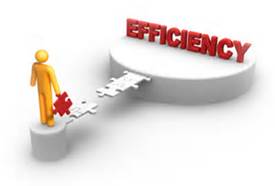Three Simple Tips to Improve Workplace Efficiency
When Jesus sent out his disciples to minister, he told them to be as wise as serpents and as harmless as doves (Matthew 10:16). To put it another way, he told them to be smart, efficient and quick to learn, but also to be gentle and humble in their approach.
Working with wisdom, integrity and passion are always worth striving for, regardless of one’s work environment. These qualities are especially true in a church or a kingdom focused business or ministry. From working in the local church for 30+ years, I’ve come across some smart working practices that improve office productivity. Here are three simple tips to improve workplace efficiency.
Synchronize Communication Systems
I once worked in an environment where people used all kinds of different systems to organize email, calendars and tasks. Some used Outlook, others preferred Goggle. Some used Franklin planners while others used nothing at all. None of these systems worked together and our office lacked efficiency because we spent too much time trying to communicate with each other.
My suggestion is to get everyone on the same system. Regardless of which one you choose, synchronizing your communication systems will save time, lower frustration and increase productivity.
Use Email R-Codes
I borrowed this idea from author and consultant Juliet Funt, but adapted it to make it my own. Ever send an email expecting to get a response, but don’t get it? Or you get the response a month later when the issue is already resolved? It’s frustrating.
 Email R-Codes are response codes to include at the end of the email subject line to indicate when you’d like your response. This lets the reader know when they should get back to you. It also gives you the assurance that the reader knows when you want to hear back from them. I suggest using four different R-Codes.
Email R-Codes are response codes to include at the end of the email subject line to indicate when you’d like your response. This lets the reader know when they should get back to you. It also gives you the assurance that the reader knows when you want to hear back from them. I suggest using four different R-Codes.
RIP = reply immediately, please. Hey, if you’re going to demand an immediate response, the least you can do is be polite. You can expect a reply within 1-3 hours.
RED = reply end of day. This is for emails that are important but don’t require an immediate response. Expect a reply within 24 hours.
RAT = reply any time. This R-Code indicates that you’d like a response but the issue is not time sensitive. You can expect a response within a week.
RNN = reply not needed. This is more a “for your information” type of email. You just want someone to know something and don’t require any response or feedback.
Lombardi Time
Legend has it that back in the 1960’s a rookie football player showed up for his first pre-season meeting for the Green Bay Packers. He arrived to the meeting on time, but when he walked into the room all the players were already there and everyone just stared at him. It was then that Hall of Fame coach Vince Lombardi explained to the rookie the expectation regarding showing up early to meetings.
Later, players referred to this as “Lombardi time.” Lombardi time meant that everyone showed up early to all meetings. The length and importance of the meeting determined how early you showed up, but regardless, the clear expectation was to show up early.
Arriving early to meetings is helpful in many ways. This built-in buffer allows time for small talk, catching up on details, and making sure the room is set up properly. Then, once those things are taken care of, the meeting can start on time.
Implementing Lombardi time at work functions better as a habit you and your coworkers develop, as opposed to a top-down command. I recommend implementing a Lombardi time expectation. It’s another great way to increase office efficiency.
These are just a few ways that we can be wise like serpents in our office environment. This will undoubtedly result in better, more efficient ministry and ultimately more effective methods for advancing God’s kingdom.